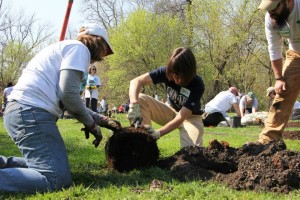Trees for Tomorrow Brings Out 171 Volunteers
Wilson kicked off its “Trees for Tomorrow” program on April 26 from 8:00 a.m. to 3:30 p.m. on the McKee Green along the Conococheague Creek. “Trees for Tomorrow” is an initiative, funded by the National Fish and Wildlife Foundation and the Foundation for Pennsylvania Watersheds, to plant 150,000 new trees in the Conococheague Watershed in Franklin County. Wilson College, in partnership with the Alliance for the Chesapeake Bay, took part of this initiative and organized the “Trees for Tomorrow” event to plant more than 300 native plants and trees on its campus. The college’s Environmental Studies Department, Fulton Center for Sustainable Living, which is celebrating its 20th anniversary this year, and College Advancement were greatly involved in the program and have been planning it for more than a year.
President Barbara K. Mistick and Franklin County Commissioners Chairman David Keller gave their opening speeches, talked about the project and its goals, and took the opportunity to thank the volunteers for their help. Volunteers from Wilson staff and students, as well as other community groups, including Girl Scouts, Boy Scouts, Penn State Mont Alto Forest Technology Program, and F&M Trust participated in the event. The 171 volunteers were instructed by tree experts and worked in teams to plant the trees in pre-dug holes along the Conococheague.

In addition to the planting, volunteers were invited to a free lunch in the Dining Hall, and a series of environmental activities was conducted afterwards. Student organizations and clubs participated with fun projects, including tie-dying, face painting, and sold different foods and beverages. Wilson offered tours to the Fulton Farm to show the college’s efforts to maintain environmental sustainability.
Christine Mayer, Program Manager of Fulton Center for Sustainable Living, said, “We have a commitment to environmental stewardship, and this is us walking the talk. I am so pleased we had this opportunity to partner with the Alliance and the county.”
Aerin Kim ’14 said, “I really enjoyed planting trees. My friends and I named all the trees we planted, which made them more precious. I hope they grow well.”
Wilson College has also shown its commitment to environmental sustainability by completing several stream improvement projects such removing the dams along the Conococheague creek to prevent flooding and allow native fish species to migrate and repopulate more freely.
“‘Trees for Tomorrow’ helps the creek restoration work on a greater level and enhances the result of our previous projects,” Mayer added.
“Trees for Tomorrow” was very successful thanks to the kind help of everyone that participated. Many people left with the hope to come back and see the trees they planted fully grown.
For more information, contact Christine Mayer at mayer@wilson.edu or 717-264-4141 ext. 3247.
